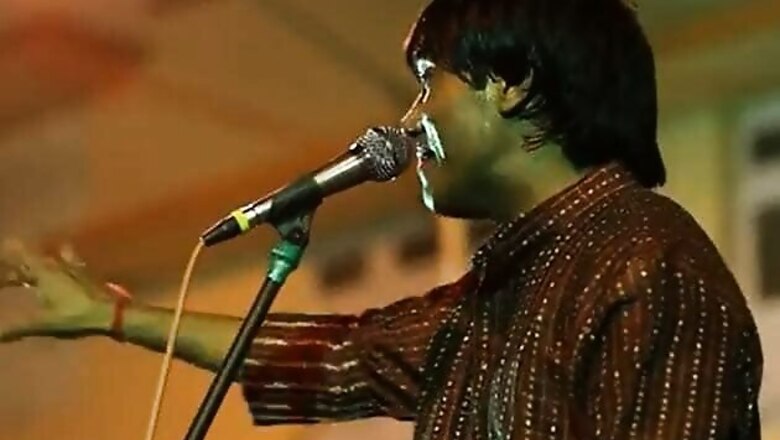
views
In Surabhi Sharma's latest documentary 'Bidesia in Bambai', music addresses desires otherwise not acknowledged in society. The 90 minute film shows us the world of the local Bhojpuri music produced in Mumbai. These songs give us a peek into the imagination of the Up-Bihar migrant in the city, the 'bidesia' in the foreign land. It is through music that the outsider makes the city his own.
The film begins with an anecdote - the migrant's wife might have access to him through the mobile phone, but shy as she is, when she calls on his number, she doesn't know what to say. Most of the Bhojpuri songs that we hear as the film progresses, deal with this absence. In the migrant's imagination, male singers imagine what the woman would say as she pines for him; she is naughty, she is direct in demanding affection. She is also imagined as wanting to be modern- "Get me jeans to wear, I don't like the sari" one song says. Kalpana, the established Bhojpuri singer, delights in the 'double meaning' of the Bhojpuri song. This is a part of tradition, she says, but unfortunately is now being seen as 'obscene'.
As much as there are raunchy numbers, there is also guilt in this male imagination at having left behind a wife back home. Why did you marry me if you had to leave, goes one song. Ramanuj Pathak, nicknamed 'chingari' by his audience, cites the example of a similar song which he sings very rarely only because it makes the audience so lonely they want to run back home.
The struggles of the local Bhojpuri music industry, as their studios often face demolition, is reflective of the precarious migrant experience itself. The migrant is constantly moved out from the centre more and more towards the suburbs, and yet builds home again and again. In one of the sequences, during a local music programme, stones are thrown at the stage. In response, some men take the stage, and say- 'don't think Mumbai is not ours'. This seems out of place, but is actually a reminder of the context within which the migrant lives- his anxieties and struggles in an increasingly hostile city. These anxieties make an appearance now and then in the film, though always indirectly. The Chhath puja celebrations , for instance, are contested. An MP organizes a Chhath celebration trying to woo them, amidst the threat of a xenophobic Marathi nationalism.
In a poignant moment, a singer explains why Bhojpuri remains unmatched in expressing what the migrant feels. He says that unlike Hindi, Bhojpuri has different words for different aches. This telling moment explains what this music means to the migrant. The songs articulate his peculiar experience of the city, giving him a language for his nostalgia and his desires. Perhaps just by acknowledging this experience, the migrant is actually laying his claim to the city that often tells him he doesn't belong there. 'Bidesia in Bambai' innovatively tackles its subject- showing us how the migrant makes his experience his own, easing the uncertainty of the 'bides'.####



















Comments
0 comment